EASTON, Pa. — Sherryta Freeman graduated from Dartmouth College, majored in environmental studies and initially thought of becoming a lawyer.
Mary Beth Spirk departed Dickinson College with a degree in criminal justice, and she, too, figured law school was in her future.
Lynn Tubman entered DeSales University (then Allentown College) in the 1980s with the intent of becoming a nurse.
So how then did they, along with Christy Malone Fleagle, become trail-blazing administrators at Lehigh Valley colleges and buck the statistic that shows fewer than 25 percent of NCAA athletic departments are led by women?
By following their hearts and continuing a passion for athletics that was fueled by competing in collegiate sports.
- Four of the Lehigh Valley's seven four-year colleges have women athletic directors
- Nationwide, just 24 percent of NCAA programs are led by women
- The locals: Cedar Crest's Christy Malone Fleagle, Lafayette's Sherryta Freeman, Moravian's Mary Beth Spirk and Muhlenberg's Lynn Tubman
“I’m sure like many 18-year-olds, I wasn’t sure what career path I was going to take. I was a nursing major, but I wasn’t sure what direction I was going to go after passing out in the operating room,” Tubman said with a laugh.
“Tom Shirley, who was my basketball coach and the athletic director (at Allentown College), was a great mentor. He asked me ‘What do I love to do?’ I said I loved playing basketball. He was probably the most influential person. He said you want to do something that you love doing. He helped me find my first job.”
Tubman, who as Lynn Butler set scoring and rebounding records that still stand at DeSales, took that first job at Penn State Mount Alto as the women’s basketball coach and assistant athletic director in 1990, shortly after earning her master’s degree from Lehigh University in higher education administration.
Tubman’s career journey returned her to the Lehigh Valley when she was named Muhlenberg College’s first permanent female athletic director in May 2018.
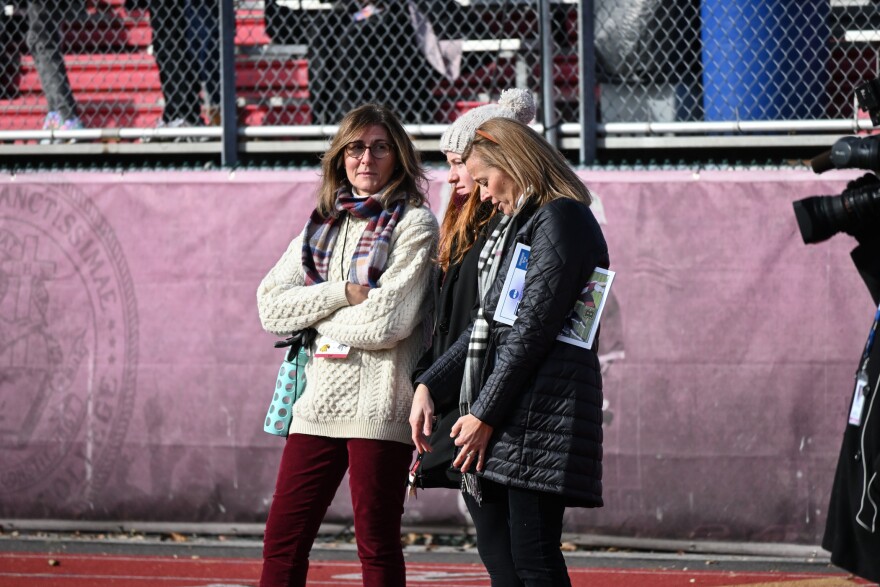
“The opportunity to come to Muhlenberg was very attractive to me because they compete in one of the best conferences (Centennial) in Division III,” Tubman said. “I was a Division III athlete and I have a great passion for that level. I thought we could do great things here, and it was a chance for me to give back.”
Freeman also was a basketball player, at Dartmouth, which won a pair of Ivy League championships during her four letter-winning seasons.
“Because I went to Dartmouth which doesn’t provide (athletic) scholarships, I was given a significant financial aid package,” Freeman said. “My work-study job was working in the athletic department helping with various tasks. I was exposed to the other side of sports, and it made sense to me to pursue it because I was passionate about sports.
“But the biggest thing I learned was it’s about relationships, building great relationships with each other (in the athletic department), not just stuffing envelopes but knowing I was part of the recruiting process. I felt proud I was a small part of bringing great student-athletes to Dartmouth.”
Since February 2018, Freeman has been building relationships overseeing Lafayette College’s more than 600 student-athletes competing in 23 varsity sports.
When she was hired to succeed longtime director of athletics Bruce McCutcheon, Freeman became only one of 54 women athletic directors at Division I’s 380 institutions – and was just one of 14 women of color.
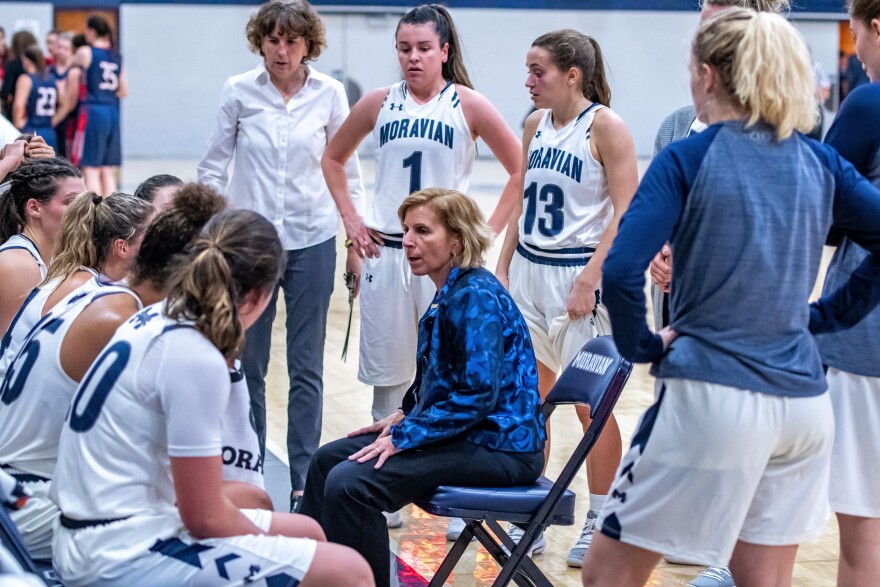
Spirk became Moravian University’s first female Director of Athletics and Recreation in June 2017 while continuing as the Greyhounds’ winningest women’s basketball coach. The 1977 Notre Dame High School graduate came on board at Moravian for the 1981-82 women’s basketball season as an assistant to Anne Skutches a few months out of college and never left.
Spirk, who played basketball and softball at Dickinson, credits longtime Moravian athletic director and legendary coach Rocco Calvo for planting the seed to expand her horizons.
“Rocco Calvo was so supportive,” Spirk said. “He always was pushing me to do more. At that point I was just coaching, and we’d have conversations when he’d ask me ‘What do you want to do?’ … He was tremendous and well before his time being fair and equal. He made sure everything was equal (between the men’s and women’s programs).”
Spirk currently is chair of the Landmark Conference athletic directors. She’s also been a leader at the Division III national level as one of three representatives to the Women’s Basketball Coaches Association Board of Directors.
When Cedar Crest’s Fleagle, who was hired at the west Allentown school last October, is added to the list, you have women leading the athletic departments at four of the seven Lehigh Valley four-year colleges. That’s 57 percent, which is a far cry from the national landscape in which only 24 percent of the people leading NCAA athletic departments are women.
“It’s really, really special to see it,” Spirk said. “I don’t know if satisfaction is the word, but it’s amazing this many (women) leaders are in this position.
The pioneers
In 1978, six years after Title IX was enacted, a group of local coaches, administrators and physical educators formed the Lehigh Valley Association for Intercollegiate Athletics for Women. It was based on a similar organization in Philadelphia. Among the local founders were Betty Prince and Diane Ketterman-Benner of Moravian, Doris Hannon of Cedar Crest, Helene Hospodar of Muhlenberg, Helen Bond of Lehigh, Barbara Young of Lafayette and Betty Wesner of Kutztown.
The LVAIAW was created at a time when women’s collegiate championships were conducted by the Association for Intercollegiate Athletics for Women. The NCAA didn’t embrace women’s national championships until 1981.
“Especially with women, we sometimes tend to doubt ourselves. The LVAIAW gave us a space where we could talk with other (women) coaches about what we were going through."Mary Beth Spirk, Moravian University athletic director
The LVAIAW’s goals were to promote women’s college sports programs through awards and accompanying publicity in the local media. LVAIAW also fostered interactions and scheduling among its members.
A survey of the LVAIAW’s award winners reveals some impressive names over the past four decades:
Cathy Engelbert – The current commissioner of the Women’s National Basketball Association was Lehigh’s basketball honoree in 1986.
Kathy Beck DeKorte – The Palmerton High School graduate led Moravian to the NCAA championship basketball game in 1992 and was selected as the Kodak Division III National Player of the Year.
Heidi Caruso Commins – An emergency medicine physician and flight doctor in the Air National Guard graduated from Lafayette in 1994 as the NCAA women’s basketball record-holder for steals in a game, season and career. She also played soccer for the Leopards.
Gina Lewandowski – The Central Catholic graduate stayed local and was a two-time Patriot League women’s soccer Player of the Year for Lehigh. She was honored by the LVAIWA in 2007. From there, Lewandowski enjoyed a lengthy pro soccer career in the U.S. and abroad and played for the U.S. national team.
Among those not specifically mentioned were a number of NCAA individual champions, especially in cross country and track and field.
The LVAIAW was a place where members could share ideas and solve similar problems. The organization enabled the student-athletes to network with their peers and coaches from other colleges.
“It was huge because very few places have something like this, and the founders had the foresight to establish something like that,” said Spirk, who’s been involved with the LVAIAW almost since its inception. “We were there in our Moravian bubble, and with the creation of it you find out there are really great women out there. As coaches, we shared some of the same stories, the same concerns.
“One of the players I coached, Camille McPherson, became the head coach at Capital University (in Columbus, Ohio),” Spirk said. “She needed help with something that she thought only was going on with her team. I told her this happens on every team.
“Especially with women, we sometimes tend to doubt ourselves. The LVAIAW gave us a space where we could talk with other (women) coaches about what we were going through. And it was a place where players from the colleges could see and talk with each other.”
From athletes to administrators
Spirk, Tubman and Freeman completed their undergraduate degrees roughly a decade apart from one another. Their career entry points shed light on the evolution of college women’s sports and the administrative positions that accompanied it.
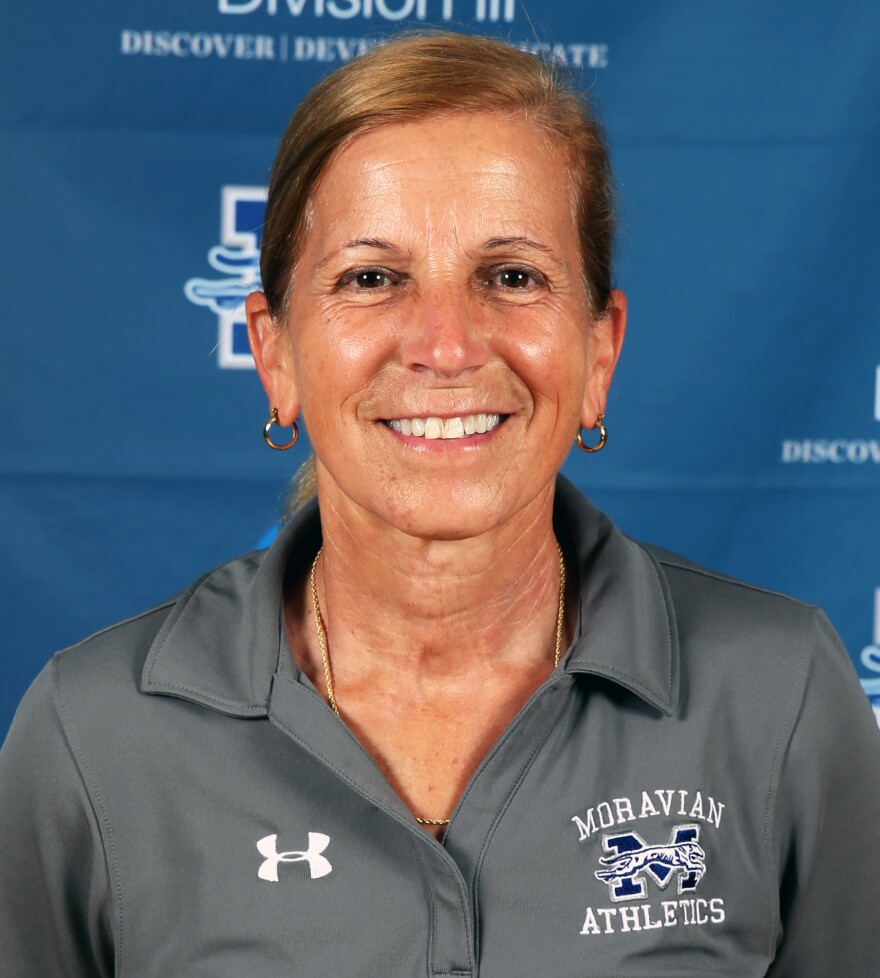
When Spirk came to Moravian, women’s varsity sports options were scarce and usually included field hockey, basketball, softball and tennis. Most of the head coaches were members of the faculty, taught physical education courses and often coached multiple sports.
“(At Dickinson), our uniforms and practice gear were ridiculous, but you didn’t think about it,” Spirk said. “Now, when you see what the kids have today with their warm-ups, the travel gear. Even practice times. We always got the later practice times in the gym. We didn’t think twice about it because that’s the way it was.”
In 1987, Skutches left Moravian to accept the head women’s coaching position at Lehigh – succeeding Hall of Famer Muffet McGraw – and Spirk was promoted to lead Moravian.
Five winters later, she was coaching the Greyhounds in the NCAA Final Four, which was held in Johnston Hall and is considered by many fans and alumni as the seminal moment in the school’s long sports history.
Spirk continued to coach and added assistant director of athletics duties in 2001. She earned her master’s in sports administration from the U.S. Sports Academy in 2002 and was promoted to associate athletic director and Senior Woman Administrator in 2011.
Six years later, Spirk was named Moravian’s Director of Athletics and Recreation.
“When you’re only coaching, you’re in your own little world and close-minded to what you’re doing,” Spirk said. “As the athletic director, there are other teams, and you need to see the big picture to help the other athletes and coaches. Being around here for so long, I could talk to our coaches, help them, and that’s something I fell in love with and thought I was pretty good at it.”
Spirk pointed to two recent interactions that have enriched her Moravian experience through being the athletic director.
“The other day I was talking with the men’s soccer goalie for about 30 minutes, and I don’t think I would’ve done that if I were only coaching,” Spirk said. “I also went with the men’s tennis team to watch its match at Goucher (in Towson, Maryland). Afterward, our coach told me how much that meant to the team. It also gave me a chance to see another campus.
“Usually, when we go somewhere to play a (basketball) game, it’s right to the gym, play the game, get on the bus and come home.”
McGraw’s leaving Lehigh in 1987 also affected Tubman’s career path.
“Coach Shirley told me ‘You’re getting your master’s right away,’” Tubman said. “At the time, Muffet McGraw was the Lehigh coach, and I was planning on being her graduate assistant. But she had just accepted the job at Notre Dame.”
Tubman still could’ve been a graduate assistant under Skutches but opted to work in residence life “because it paid more.” She also volunteered in the athletic office helping Senior Woman Administrator Karen Adams.
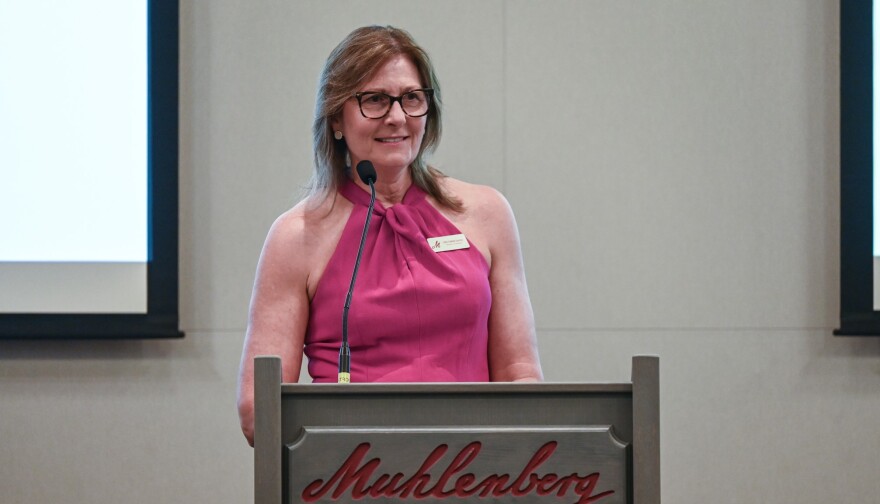
Those experiences led Tubman to being hired in 1989-90 at Penn State’s Mount Alto campus. She stayed there for one year before La Roche College in Pittsburgh hired her as the athletic director and women’s basketball coach.
At La Roche, Tubman served as the basketball coach for two seasons before turning her full attention to guiding the athletic department from NAIA to NCAA Division III.
“I became the athletic director at La Roche at 24,” Tubman said. “I probably had no business being hired (at such a young age), but a former dean of students at Allentown, Steve Sivulich, was the vice president for student affairs at La Roche. He was the person who hired Tom Shirley to coach and be the athletic director at Allentown when he was just 26.
“When I look back at it, it’s still pretty amazing. In western Pennsylvania, most of the smaller schools were still NAIA. I was fortunate at Allentown that we already had made the transition to the NCAA. It was a better direction for La Roche, and I’m proud of it. At La Roche, we started the trend (in western Pennsylvania) away from NAIA.”
In 1996, Tubman ascended to the Division I level when she was hired by Drexel University as the associate athletic director and Senior Woman Administrator. She stepped away from athletic administration from 1999-2004 to raise her two daughters.
From 2004-2009, Tubman returned to serve as the associate athletic director and SWA under Shirley, the director of athletics and women’s basketball coach at Division II Philadelphia University.
“When I was at Philadelphia with Coach Shirley, I knew he was preparing me to become an athletic director,” Tubman said.
Tubman took that next big step in her career just a few miles away at Chestnut Hill College in northwestern Philadelphia.
“I was there for nine years, and it was wonderful; we accomplished a lot during those nine years,” said Tubman, who oversaw the addition of four varsity sports while the department was regularly earning Division II awards of excellence.
Tubman brought all these administrative experiences and skills acquired at every NCAA level to Muhlenberg in 2018.
“I was fortunate I had people who believed in me along the way,” Tubman said.
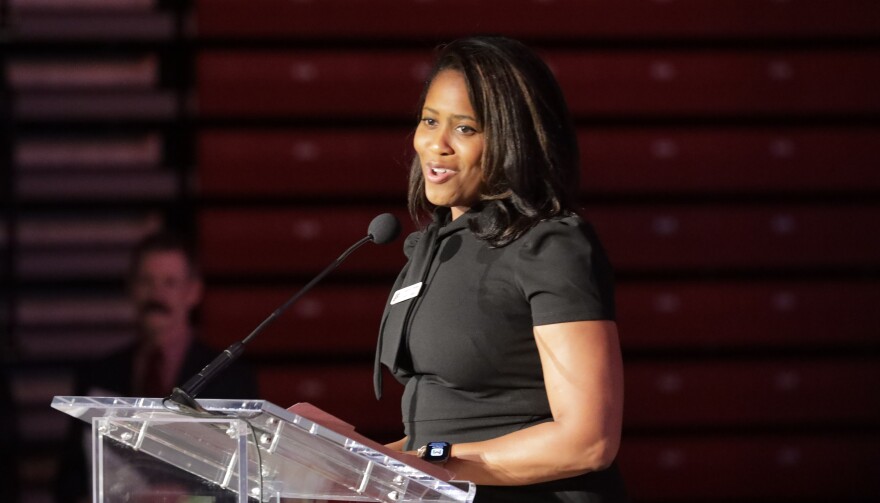
So, too, did Freeman, who graduated from Dartmouth in 2001. Unlike when Tubman started, Freeman had many women administrators serving as role models.
“I feel fortunate that throughout my career I’ve had really good mentors who were investing in me,” Freeman said. “There were plenty of women in leadership roles. I saw others who were successful who I could network with. It taught me that some day I could be a mentor to others, which I still am.”
Even though she played basketball at Dartmouth, Freeman realized early on her career in college athletics wouldn’t be as a coach. Breaking down game film for hours on end and sitting in gyms watching potential recruits play AAU ball wasn’t for her.
But she did follow up on a suggestion by her coach, Chris Wielgus, to serve an internship with USA Swimming in Colorado Springs between her junior and senior years.
“That was a great experience because it was an Olympic year, 2000, in Sydney (Australia),” Freeman said.
“I feel fortunate that throughout my career I’ve had really good mentors who were investing in me.”Sherryta Freeman, Lafayette College athletic director
Upon graduation, Freeman interned in the Ivy League office before earning her master’s degree in sports management from the University of Massachusetts in 2004. Those building blocks set the foundation for Freeman to return to Dartmouth and serve for two years as the assistant athletic director for compliance.
Freeman expanded her responsibilities during her 10 years (2005-2015) at Temple, starting as the assistant AD for compliance and rising to become the Senior Associate AD from 2011-15.
That led to her being named the University of Pennsylvania’s Senior Associate AD and Senior Woman Administrator from 2016 until leaving for Lafayette in 2018.
“At each place I had opportunities to shine,” Freeman said. “All these opportunities helped me along the way. I’m proud that what I’ve gotten (promotions) was earned.”
Freeman also said she’s used her experiences as a college athlete to advise her student-athletes and help guide her through tough times.
“Athletics teach you resiliency,” she said. “You don’t always get everything you want. Sometimes, you get beat out. You learn how to compete, how to battle. Sometimes, you think you should be playing more, you lose games. You learn how to reset and refocus and keep going.”
Freeman completed the NCAA Pathways Program during her time at Penn. The leadership program seeks to assist minority and/or women administrators to become athletic directors.
“When I was going through it while I was at Penn I hadn’t thought about becoming an athletic director per se, but coming through it made the light bulbs come on that I can do it,” Freeman said.
When the Lafayette position opened, Freeman said the opportunity to lead a Division I program at a school with high academic standards aligned with her values. The more Freeman learned about Lafayette, the more it reminded her of her years at Dartmouth in Hanover, New Hampshire, as both an undergraduate and administrator.
“The most fun I have is watching our student-athletes compete … walking into the gym to see them compete or watching them leave it all out on the field. I know how much they put into it, and you want to see them rewarded,” Freeman said. “I love what I do. It’s a career that you spend a lot of time working in the office or out at games. It’s important to try and maintain a balance between your professional and personal life.”
Believing in yourself
Tubman said she’s never had to overcome any “overt obstacles” as a woman administrator, but there were times early in her career when there were those “What am I doing here?” moments.
“Being a very young woman in a predominantly male world and being in a conference where I was the only woman (athletic director), that could be intimidating,” Tubman said. “You know you belong, and you have to believe in yourself. At times it felt overwhelming but looking back it really wasn’t.”
Wow! @bethmowins delivered a Commencement address I will never forget. What an inspiration to the Class of 2023 and all that were there to listen. “Don’t walk quietly through this life. Make some noise.” ~ Beth Mowins pic.twitter.com/JLS1r1EqQb
— Sherryta Freeman (@LafayetteAD) May 20, 2023
Freeman said she’s experienced similar feelings.
“There’ve been moments when you think ‘Do I belong? Do I have the ability?’” she said. “You don’t see many people that look like you. You have to remind yourself that you’ve been put in this position to do your job. It’s been more me coming to terms that I can do the job.”
Spirk grew up in the Miller Heights section of Bethlehem Township with five brothers, who were all athletes, and two sisters.
“They all played football and wrestled,” Spirk said. “Because I was in the gym at their matches, I always wanted to wrestle as a youngster, but there was no wrestling for girls back then.”
What Spirk also noticed from hanging around her brothers was that boys seemed to possess more confidence, even brashness, in their ability to succeed.
“As women, we may need a little boost,” Spirk said. “My five brothers were there the night I won my 600th game, and one of them said to me, ‘if I were coaching your team I’d have 700 wins by now.’ Guys are a little more confident.”
Spirk even revealed she still might just be coaching if not for a pep talk from one of her brothers.
“I was thinking of not taking the (AD) job, and I was literally walking across Main Street (to the administration office) when I was talking to my brother,” Spirk said. “He said, ‘Why wouldn’t you take the job? You’re good enough!’”
You can be good enough, but there are always reminders that college sports administration is still looked at as a man’s world.
“I often tell the story here when our football team went to the quarterfinals in the NCAA playoffs,” Tubman said. “We went on the road with the team to represent the school. There was myself and two of our (athletic) administrators, who also are women. We were just leaving a press conference when someone asked us ‘Are you the wives of the football coaches?’”
Corky Blake is a freelance writer who has been covering high school, college and pro sports in the Lehigh Valley for more than 40 years. He can be reached at corkyblake1313@gmail.com

